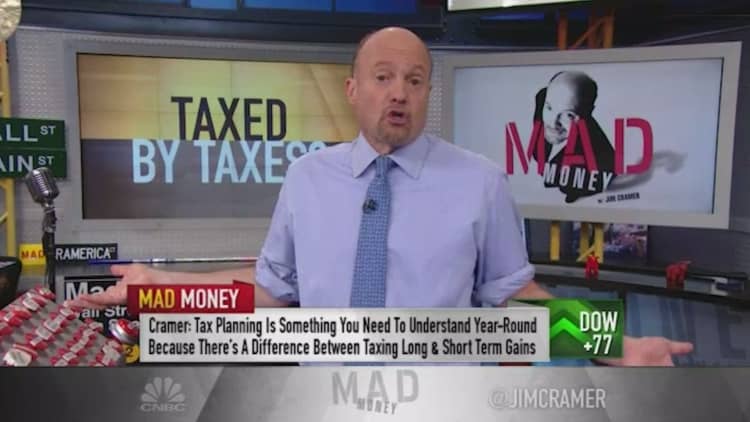When you deal with financial planning, there is no way to avoid the tax man.
Jim Cramer has an important rule of thumb about taxes: it's OK to pay them, and investors should not let the tax man make investment decisions for them.
"A lot of people like to wait until the end of the year, or even until we get right up to that April 15 tax return deadline before they talk about tax planning, but the truth is, tax planning is something you need to understand year round," the "Mad Money" host said.
One issue that has plagued investors for ages is the difference between how long-term and short-term capital gains are taxed. Essentially, if you buy a stock and then sell it less than a year later, the profits count as a short-term capital gain and are taxed at an ordinary income tax rate. That rate can range as high as 39.6 percent under the Obama administration.
But what if you hang on to the stock for more than a year and then sell it?
Profits from that sale would be considered as a long-term capital gain in the eyes of the IRS. For most people, the long-term capital gains rate is 15 percent or 20 percent, if you are in a higher tax bracket. And yes, if you are in the top three tax brackets there is a 3.8 percent surtax that you have to pay on the smaller balance of your net investment income or modified adjusted gross income. But these tax rates are still a heck of a lot cheaper than the ordinary income tax rate!
But the real problem is that many investors look at their taxes and see how much more they paid for short-term gain tax because they held a position for less than a year, and kick themselves for not holding it over a year.
"I think it's a very bad idea to let tax planning have too much control over your portfolio," Cramer said.
The reality is that certain stocks don't have the ability to hold gains for that long. Many biotechs and cloud stocks require you to sell them in less than a year in order to lock in gains. So it can be treacherous for your portfolio to let the tax man rule your decisions.
However, the good news is that if your winning stock were to turn into a loser, you would not have to pay tax on the loser. That is because when you sell a losing stock, it will offset the gains from your winning stocks. But even that approach is not recommended in every situation by Cramer.
"I am saying that you should never keep holding a stock that could have an iffy future just so you can avoid paying the higher short-term capital gains rate," he said.
----------------------------------------------------------
Read more from Mad Money with Jim Cramer
Cramer Remix: Make these changes now
Cramer: This precious metal is a must
Cramer: Forget sectors! The right way to diversify
----------------------------------------------------------
That is why Cramer has one simple rule when it comes to taxes: It is OK to pay them. Investors may not like it, but it is inevitable. When you make money, the government takes a cut of it. That is just how it works. Just don't let these tax considerations rule your investing decisions!
OK, maybe an exception to the rule would be if you held a stock for 364 days, and there is no harm in waiting a few days to sell it to cross the one-year mark. But unless you're at that point, taxes shouldn't be a factor in your decision.
"Better to pay a bigger tax bill on a terrific gain than a smaller tax bill on a tiny gain," Cramer said.



